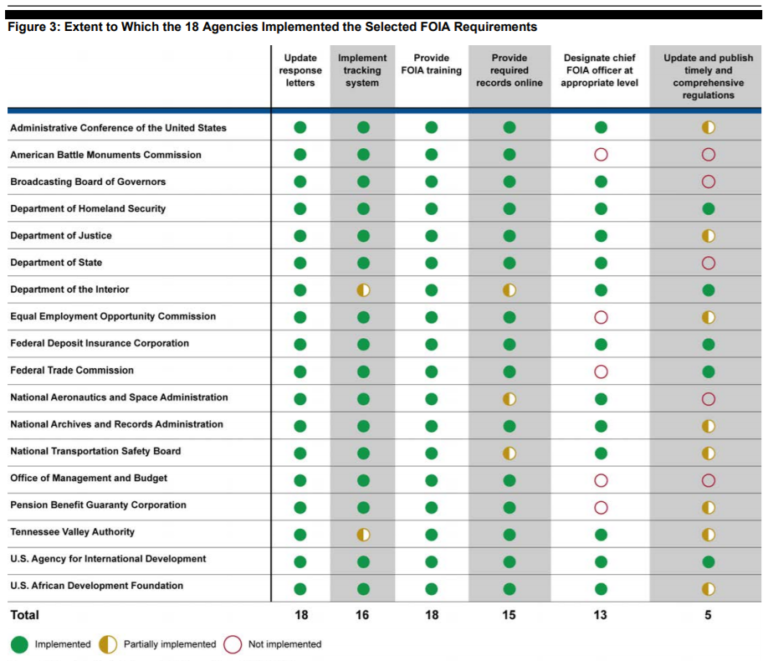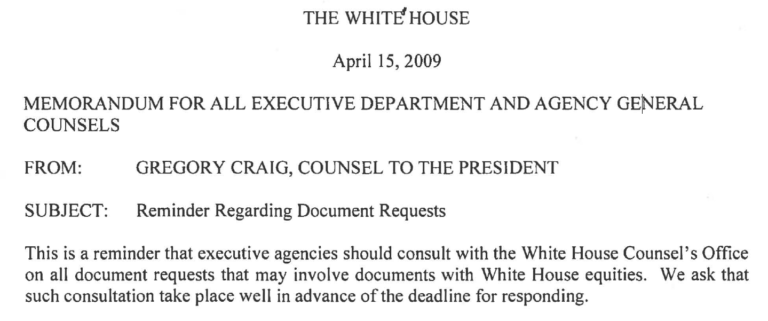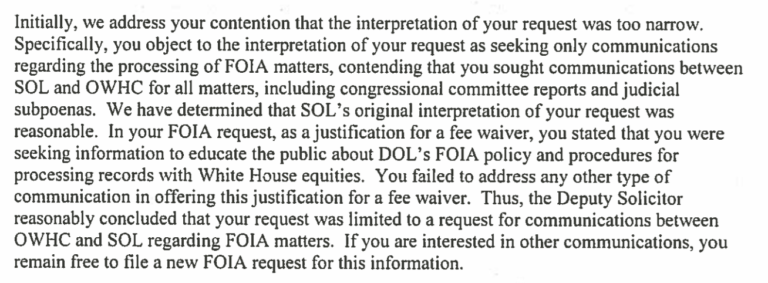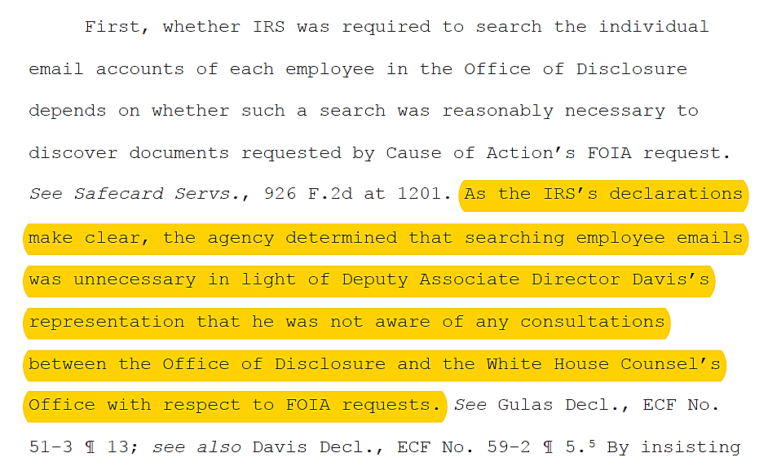A report released yesterday by the Government Accountability Office (“GAO”) provides alarming details about the dearth of agency efforts to fully implement the Freedom of Information Act (“FOIA”). GAO previewed a draft of its report in March 2018 when its Director of Information Technology Management Issues, David Powner, testified at a hearing on FOIA compliance before the Senate Committee on the Judiciary. At the time, GAO published a concurrent report on how federal courts regularly fail to refer cases to the Office of Special Counsel (“OSC”) to determine whether disciplinary action is warranted in instances where officials have acted arbitrarily or capriciously in withholding records. (Cause of Action Institute’s (“CoA Institute”) commentary on that issue can be found here.) Yesterday’s report finalizes GAO’s findings and incorporates feedback from the eighteen agencies in the sample subject to the audit.
Many Agencies Have Failed to Update Regulations and Appoint Chief FOIA Officers
One aspect of GAO’s audit involved reviewing whether the eighteen agencies properly implemented various requirements introduced by the FOIA Improvement Act of 2016 and the OPEN Government Act of 2007. Those amendments to the FOIA require agencies, inter alia, to designate chief FOIA officers, publish timely and comprehensive regulations, and update response letters to indicate things such as an extended, 90-day appeal period. GAO also evaluated what efforts were underway by the Office of Management and Budget and the Office of Information Policy to develop a government-wide FOIA portal.
The chart above, which is taken from the GAO report, encapsulates some of the unfortunate findings. Even though it is a statutory requirement, five of the eighteen agencies have not designated a chief FOIA officer in line with applicable requirements (e.g., appointing a senior official at the Assistant Secretary or equivalent level). Chief FOIA officers are responsible for monitoring agency-wide compliance with the FOIA, making recommendations for improving FOIA processing, assessing the need for regulatory revisions each year, and serving as a liaison with the Department of Justice Office of Information Policy, the Office of Government Information Services, and the Chief FOIA Officers Council. It remains unclear why some agencies are reticent to comply with this aspect of the FOIA.
Another disturbing finding is that few agencies in the sample timely updated and published regulations to implement the FOIA Improvement Act of 2016. At least five agencies have deficient regulations—such as the Department of State—or have not bothered to issue a preliminary rulemaking—such as the White House Office of Management and Budget (“OMB”). Agencies offered several reasons for why they have not complied with the law, with most citing a lengthy internal review process. The State Department explained that it had just finished updating its regulations before passage of the FOIA Improvement Act. The U.S. African Development Foundation, however, claimed that it did not even need “to disclose information regarding fees in their regulation” because it “has not charged a fee for unusual circumstances.”
OMB’s failure to satisfy GAO’s criteria for proper FOIA regulations is unsurprising and indicative of a general disregard for regulatory compliance with the FOIA at the agency. For example, for the past few years, CoA Institute has carefully tracked whether agency FOIA regulations have been updated to include the current statutory definition of a “representative of the news media.” Prior to the D.C. Circuit’s landmark 2015 decision in Cause of Action v. Federal Trade Commission, many agencies relied on OMB’s Uniform Freedom of Information Fee Schedule and Guidelines to impose an “organized and operated” standard that deprived nascent media groups of preferential fee treatment. The OMB Guidelines, which were written in 1987, have never been updated, despite requests from the FOIA Advisory Committee and the Archivist of the United States. CoA Institute thus filed its own petition for rulemaking on the issue in June 2016, followed by a lawsuit last November after OMB failed to respond.
Agencies Have Made Little Progress on FOIA Backlogs
Another aspect of GAO’s audit involved examining whether the eighteen agencies had made any headway in reducing their FOIA request backlog, as well as cataloging the statutes used in conjunction with Exemption 3 to withhold records from the public. GAO found that few agencies had managed to reduce their outstanding backlog. One major reason for the lack of progress on reducing backlogs was the failure of most agencies to implement “comprehensive plans” laying any sort of strategy. As for GAO’s catalogue of statues used to withhold information exempt as a matter of law, the most commonly cited provisions were 8 U.S.C. § 1202(f), which concerns records about the issuance or refusal of a visa, and 26 U.S.C. § 6103, which protects the confidentiality of tax returns and return information.
GAO’s audit is an important indication of how far many agencies must go to comply fully with the FOIA. This is particularly true insofar as GAO’s findings can be generalized across the entire administrative state. Congress, the transparency community, and the American public must exert even greater pressure on Executive Branch agencies to meet their obligations under the law and to improve their commitment to open government.
Ryan P. Mulvey is Counsel at Cause of Action Institute






